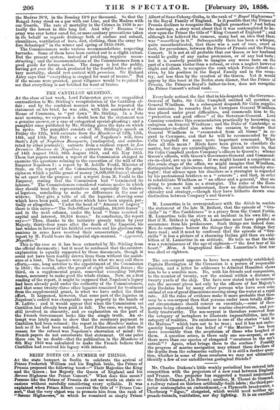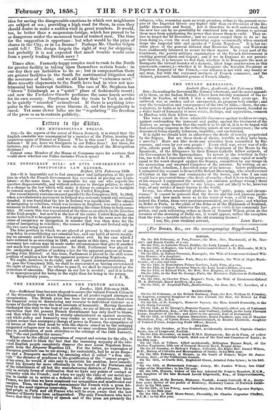BRIEF NOTES ON A NUMBER OF THINGS.
Ax the state banquet in Berlin to celebrate the arrival of Prince Frederick William and his English bride, the Prince of Prussia proposed the following toast—" Their Majesties the King and the Queen ; her Majesty the Queen of England and his Serene Highness the Prince Consort." What does this mean? Persons like the Prince of Prussia do not use words on state oc- casions without carefully considering every syllable. It was explained when Prince Albert received the title of "Prince Con- sort," that the very object was to promote him from the rank of " Serene Highnesses," in which he remained as simply Prince Albert of Saxe-Coburg-Gotha, to the rank of " Royal Highnesses " in the Royal Family of England. Is it possible that the Prince of Prussia declines to recognize this English promotion? Just before the marriage, a story went about that it was contemplated to be- stow upon the Prince the title of "King Consort of England" ; and although few believed the rumour, many had an idea that there was "something in it." Subsequently there has been a whisper, quite unauthenticated, that there was a sort of race, overt or tacit, for precedence, between the Prince of Prussia and the Prince Consort. It is not at all probable that our Queen or her husband would be guilty of any undue pretension, or of any bad taste ; but it is scarcely possible to imagine any worse taste on the part of a German visitor than a refusal, or even a neglect however slight and silent, to recognize the rank which Prince Albert de- rives, by his position in the Royal Family and in the coun- try, not less than by the creation of the Queen. Yet it would appear by this toast at the Berlin state dinner, that the Prince of Prussia, the Princess Royal's father-in-law, does not recognize the Prince Consort's actual rank.
Everybody noticed the fact that in his despatch to the Governor- General of India, Sir Colin Campbell omitted all mention of General Windham. In a subsequent despatch Sir Colin sulies
e that omission; he remarks that at Cawnpore General Win • m, was placed under great difficulties, and commends him to the " protection and good offices" of the Governor-General. Lord Canning construes this commendation practically by bestowing an eulogium on General Windham ; and the Duke of Cambridge as Commander-in-chief also seizes the occasion to declare that General Windham is " exonerated from all blame " in re- gard to Cawnpore, and that he will be recommended by Sir Colin Campbell for some more important command. What does all this mean ? Hints have been given. to elucidate the matter, but they are unintelligible. One hinted motive is, that Sir Colin Campbell prefers Company's officers to Queen's ; Whence Queen's officers, with Queen's Governors-General and Command- ers-in-chief, are up in arms. If we might hazard a conjecture at this crude stage of the affair, we might imagine that Windham, distinguished for chivalrous daring, had proved an unlucky stra- tegist; that silence upon his disasters as a strategist is regarded by his professional brethren as a " censure" ; and that, in order to rehabilitate Windham as " an officer and a general," they are going to promote him as a strategist. The rules of the Horse Guards, we can well understand, draw no distinction between chivalry and strategy,—though they have hitherto drawn some distinction between Company's and Queen's.
M. Lamartine is in correspondence with the Slide to confute the statement of the late M. Brifaut, that the episode of " Gra- ziella " in " Mes Confidences" is a piracy from the Count Forbin. M. Lamartine tells the story as an incident in his own life; so that if M. Brifaut is right, M. Lamartine must have pirated an occurrence from his predecessor. Such things are indeed done. Men do sometimes borrow the things they do from things they have read ; and it must be confessed that the episode of " Gra- ziella " is less a picture of a charming Italian girl than an exhi- bition of M. Lamartine in an attitude. He tells us that the tale was a reminiscence of the age of eighteen—" the first tear of his heart." Mem. A biographical fact—M. Lamartine's first tear was shed at eighteen.
The sea-serpent appears to have been completely. established. Captain Harrington of the Circassian is a person of responsible position, and a letter he addresses to Admiral Hamilton shows him to be a sensible man. He, with his friends and companions, to the number of twenty, saw the animal within a distance of twenty yards of the ship. The facts now stated tend to corrobo- rate the account given not only by the officers of her Majesty's ship Daedalus but by many. other persons who have seen some animal at sea of great dimensions movino along the water at a rapid rate. All the rules of evidence make it more probable that there may be a sea-serpent than that persons under suon totally differ- ent circumstances should concur on essentials,—some of these persons being educated, trained to marine observation, and per- fectly trustworthy. The sea-serpent is therefore removed from the category of metaphors to illustrate impossibilities, into the category of realities. Its existence is one of the stories " told to the Marines" which turn out to be true ; and it has not unfre- quently happened that the belief of "the Marines" has been more reasonable than the scepticism of those who laughed at them. A question arises, is there only one sea-serpent, or are there more than one species of elongated " creatures us the sees entrall" ? Again, what brings them to the surfaoe ? Possibly the progress of marine navigation may attract these dwellers of the depths from the submarine valleys. It is still a further ques- tion, whether in some of these creatures we may not ultimately identify a few of our antediluvian geological friends ?
Mr. Charles Dickens's little weekly periodical has entered into competition with the .projectors of a new road between England and France. One projector has suggested a tunnel underneath the British Channel, 1 la Brunel ; another, M. Thome do Gamond, a railway raised on thirteen artificially-built islets ; thethird pro- jector contemplates an embankment,—a Plymouth breakwater, a Cherbourg digue," elongated, which would need neither ap- proach-tunnels, ventilation, nor day lighting. It is an excellent idea for saving the disagreeable emotions to which our neighbours are subject at sea providing a high road for them, in case they should desire to make a sudden visit in great numbers. It would, too, be better than a suspension-bridge, which has proved to be so d : dangerous under the measured tread of men. The time for the suggestion is opportune : but what would be the price of shares in the City, or in La Bourse ? Perhaps Mr. Charles Gilpin could tell ? The design forgets the right of way for shipping : but probably it is not expected that much trouble would arise from a purely trading British navy ?
Times alter. Formerly happy couples used to rush to the North for greater facility in taking upon themselves certain bonds : in our day they are forbidden to do so ; but in compensation there are greater facilities in the South for matrimonial litigation and the severance of bonds ; and we all know that " extremes meet." More recently elopements to the North have had in view not ma- trimonial but bankrupt facilities. The ease of Mr. Stephens has " blown " Edinburgh as a " quiet " place of fashionable resort ; and now the Yorkshire Gazette performs the same harsh service for its own county. Gentlemen take the train to York in order to be quietly " recorded" as insolvent. If there is anything irre- gular m the course, the press blazons it, and the irregularity is cured. Yet some clever folks are for " regulating " the freedom of the press so as to restrain publicity.



































 Previous page
Previous page